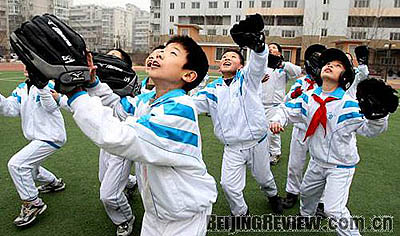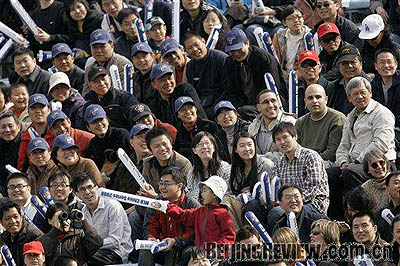|

LITTLE LEAGUE: Young fans in Beijing learn the basics before a March exhibition game in Beijing. Youth programs are a big focus for Major League Baseball's expansion into China
COURTESY OF MLB
On the weekend of March 15, two American major league baseball teams met in Beijing for two exhibition games to show Chinese crowds just how exciting America's favorite pastime can be. The San Diego Padres faced the Los Angeles Dodgers, in front of a near sellout crowd of 12,224 at the new Olympic venue. Vendors plied the crowd with hot dogs, peanuts and--in a nod to local tastes--tea, and spectators gamely tried to sing along to Take Me Out to the Ball Game. Nobody seemed to mind that the game ended in an inconclusive tie.
Americans think of baseball as a cultural tradition, a pastime that is ingrained into the history of the country. Walt Whitman, American poet, wrote that baseball is, "America's game; it has the snap, go, fling of the American atmosphere; it belongs as much to our institutions; fits into them as significantly as our Constitution's laws; is just as important in the sum total of our historic life."
But try telling that to fans of Bangqiu, Mandarin for baseball, who see the American pastime as an Asian sport, and who are eagerly looking forward to watching the national team play with a home field advantage in the Olympic Games.
"To be considered a global sport, we need to be significant in the world's most populous country, and more importantly, I think we have an opportunity to be successful in doing that," said Jim Small, Vice President, Asia, of Major League Baseball (MLB), the organization that operates professional baseball's two major North American leagues, the National League and the American League.
"The Chinese mainlanders look at baseball as an Asian sport, not necessarily an American sport," Small said. "They see that it is played at a very high level in countries and regions such as Japan and Taiwan and they think ‘why not us?'"
The personality traits of a good baseball player--selflessness, a lack of individualism, and a love of strategy--are all a fit with the Chinese culture, he added. And the MLB hasn't overlooked the fact that developing a bigger fan base in the country could have major payoffs down the road.
"We're just like everybody else in that we see the potential of 1.3 billion people and the emerging economy," Small said, adding that there is no deadline MLB is working under in their development in China. The efforts to create a fan base are ongoing, and the organization has a 10-year development plan underway.
Bringing back baseball
To build up a base, MLB doesn't have to start from scratch, Small said. The Shanghai Baseball Club was established in 1863, and the first league was established in 1914 for six Huadong (east China) area universities. Baseball fell out of favor as a Western sport in New China and was banned during the "cultural revolution" (1966-76). Since the 1980s, however, the sport has been making a comeback. In 2003, Dynasty Sports Marketing signed a special agreement with the Chinese Baseball League (CBL) and MLB to bring two American Major League All-Stars, the Dodgers' Jim Lefevbre and the Red Sox Bruce Hurst to be the head coach and pitching coach of the Chinese national baseball team.

HOME RUN: Spectators gather to watch the Los Angeles Dodgers versus the San Diego Padres in the first Major League Baseball exhibition game in Beijing, held in March
COURTESY OF MLB
The recent exhibition games were also part of the MLB's effort to build support for baseball in China. Small said the games were well attended, and well covered by local and international media.
"The games were part of our long-term strategy there. If we're going to have baseball take root there the way I think we can, we have to have the right strategy in place," Small said.
That strategy is "like a railroad track," Small added, with two lines of development running parallel to each other. One rail is making the game more popular and giving more visibility to the sport in China.
"That's putting balls in kids' hands, and grassroots programs in schools like the Play Ball! program. It's opening up retail shops throughout the country. It's television coverage and it's things like these games that created all that hoopla and hype," Small said.
"Play Ball!" was launched last year in five cities across China that incorporated baseball into the physical education curriculum for more than 100,000 students aged 8-12 in 120 elementary schools.
| 